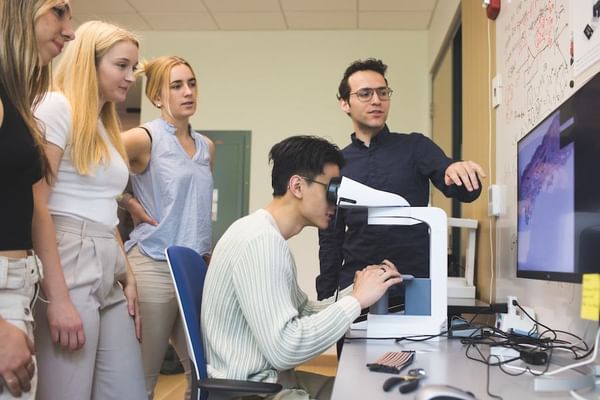- Undergraduate
Bachelor's Degrees
Bachelor of ArtsBachelor of EngineeringDual-Degree ProgramUndergraduate AdmissionsUndergraduate Experience
- Graduate
Graduate Experience
- Research
- Entrepreneurship
- Community
- About
-
Search
All Thayer News

Giving Microscopes a Digital Makeover
May 24, 2023 | Dartmouth News
Instead of using samples mounted on glass slides, a new smart microscope created by Dartmouth Health dermatopathologist Aravindhan Sriharan and students at the Digital Applied Learning and Innovation (DALI) Lab will allow clinicians to diagnose disorders from digital images.

Ziray Hao '22 looks at a plate through the smart microscope while fellow DALI Lab students Lauren Kidman '25, Lauren Goyette '23, Jorie MacDonald '25, and BE candidate Alexander Carney discuss the project. (Photo by Katie Lenhart)
By combining the brains of a computer with the design of a medical microscope, RavaOne: The SmartScope is poised to integrate traditional microscopy with rapidly emerging health care technologies that rely on artificial intelligence and expand the possibilities of telemedicine, says Sriharan, who is an assistant professor of pathology and laboratory medicine at the Geisel School of Medicine.
Lauren Goyette '23, an engineering major with an interest in product design, began working on the project as a designer last fall.
"Pathologists are so efficient with microscopes; it's very impressive," she says. The challenge, as Goyette saw it, was to help them work at speed as they made the transition to the digital microscopy world. She worked on creating the SmartScope's chassis using 3D printing.
Complete with an eyepiece and a stage for the glass slide to sit on, the SmartScope preserves the familiar form of a laboratory microscope.
What's different is that in place of a laboratory slide with stained tissue, the SmartScope stage holds a "dummy" slide. As a user moves this slide, a camera and computer system track its position. This movement is linked to the digitized, high resolution picture of a tissue sample, which moves as the user looks through the eyepiece, mirroring the experience of a conventional microscope.
"Just getting an image to display was a major milestone," says Thayer BE student Alex Carney who has also been with the project all along as a developer. Subsequently, he worked on getting the large image file to move smoothly across the user's field of vision as they moved the glass slide on the stage.
"The goal is to make a product that someone would be comfortable using for multiple hours a day to do real work—real research and diagnostics. We're still working on that and we're very close, but that was the biggest challenge of this project," says Carney, who didn't anticipate how much the project would sharpen his math and software skills when he began.
The device is patent pending, and will form the cornerstone of PixCell, a new startup incorporated by Sriharan. "The SmartScope can finally actualize the promise of AI in disease diagnostics," he says.
Sriharan believes that the technology can transform health care not just in countries that are leading the change but also in resource- and expertise-limited regions. The device would help providers on the ground screen cases to identify the ones that need immediate attention, sending them on to colleagues and volunteers across the globe.
Pathologists can run AI algorithms to simulate the results of expensive and time-consuming laboratory tests on the images they examine, saving patients time and money. The algorithms can also help chart the likely course of the disease and recommend effective treatments.
"We can actually bring first-world medicine—not watered down, but high-tech and cutting edge—to people who need it most," says Sriharan.
Other members of the DALI team who worked on developing the RavaOne: SmartScope include Andy Kotz '24, Ziray Hao '22, Atharv Agashe '25, Elizabeth Frey '24, Victor Muturi '23, Lauren Kidman '25, Daniel Lubliner '25, Annie Qiu '24, Emily Chen '24, Ülgen Yildirim '24, Alejandro Lopez '23, Joy Miao '23, and Kelly Song '23.
Link to source:
https://home.dartmouth.edu/news/2023/05/geisel-professor-gives-microscopes-digital-makeover
For contacts and other media information visit our Media Resources page.
